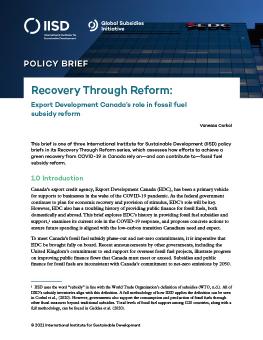
Recovery Through Reform: Export Development Canada's role in fossil fuel subsidy reform
This brief explores Export Development Canada's history in providing fossil fuel subsidies and support, examines its current role in the COVID-19 response, and proposes concrete actions to ensure future spending is aligned with the low-carbon transition Canadians need and expect.
-
Export Development Canada, a Crown corporation, provides an average of over CAD 13.2 billion in support for oil and gas every year, representing over 12% of finance committed by the institution.
-
EDC's support for fossil fuels significantly outpaces its support for cleaner options.
-
There is a lack of transparency regarding how EDC screens potential clients for social and environmental risks, including climate change.
Canada’s export credit agency, Export Development Canada (EDC), has been a primary vehicle for supports to businesses in the wake of the COVID-19 pandemic. As the federal government continues to plan for economic recovery and provision of stimulus, EDC’s role will be key. However, EDC also has a troubling history of providing public finance for fossil fuels, both domestically and abroad. To better leverage EDC's role in green recovery, Canada should:
- Draw inspiration from—and match the ambition of—leading public finance institutions that are restricting investments in fossil fuels.
- Improve EDC's internal climate policy and targets to align with Canada's net-zero goals.
- Apply "green strings" to finance provided through EDC, including financial conditions, requirements for companies to have net-zero plans, and transparency on spending.
This brief is one of three International Institute for Sustainable Development (IISD) policy briefs in its Recovery Through Reform series, which assesses how efforts to achieve a green recovery from COVID-19 in Canada rely on—and can contribute to—fossil fuel subsidy reform.
Funded by
You might also be interested in
The Cost of Fossil Fuel Reliance
Government support for fossil fuels reached at least USD 1.5 trillion in 2023, new data shows.
Increased Support Needed to Achieve India's Clean Energy Goals
India is on track to achieve many of its 2030 clean energy goals but needs to step up government support measures to accelerate the deployment of offshore wind, electric vehicles, and green hydrogen, according to a new report.
Ending Export Credits for Oil and Gas: How OECD countries can end 2024 with a climate win
For a year now, Organisation of Petroleum Exporting Countries (OECD) governments have been negotiating an agreement that could put an end to oil and gas export finance. Following the acrimony in Baku, this would be a very real way for the OECD to show policy coherence, respond to calls from the poorest countries to stop subsidizing fossil fuels, and shift public finance to solutions.
Fossil Fuel Production, Renewable Energy, and Subsidy Reform in Nationally Determined Contributions 3.0
This policy brief provides an analysis of the critical benchmarks and recommendations necessary for aligning nationally determined contributions (NDCs) with the 1.5 °C target.